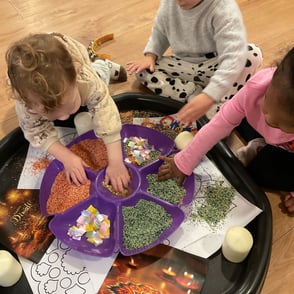As parents and educators, we strive to create a safe and enjoyable environment for our children to grow and learn. We want them to be carefree, happy and able to take each opportunity that is presented to them. We want them to see the world as a good place, and to foster understanding and harmony. However, we know all too well that the world is not an ideal place. Unfortunately, many of us will have faced discrimination and prejudice for who we are, whether that be on the basis of race, sexuality, gender or disability.
Over the last year, hate crimes towards Asians in the UK have increased by over 300%, with many people having been victims of violent street attacks and abuse, exasperated by the Coronavirus pandemic. The terrorist shooting in Atlanta, which took the lives of 8 women, is further evidence of the painful, deadly xenophobia that exists. At Hatching Dragons, we believe that collective action is pivotal in overcoming the injustice members of our community face, especially People of Colour (POC). So, what can we do to inform our young children of these issues, to ensure that the next generation is far more accepting and tolerable than the last? Today we will focus on how to discuss racism with kids, offering our advice and experience.
Tips on How to Discuss Racism With Kids
1. Check Yourself
It is often said that children are like sponges: listening, learning and then copying. Therefore, we must first hold ourselves accountable. Racism is learned and often inherited. We must be aware of the language that we use and our own behaviour. It is incredibly difficult to face, but we often have our own internalised biases. When we as adults make a conscious and consistent effort to encourage and utilise acceptable language and behaviour, children will consider that as normal and the default.
2. Hold Others Accountable
Lead by example. Whenever you hear something unacceptable, and it is safe to do so, announce it as such. Demonstrate that you find said matter inexcusable. We need children to see just how intolerable microaggressions are, and to be able to recognise them. This can be done in a polite and civil way, as we certainly do not suggest putting yourself in any harm. For example, phrases such as “could you please clarify what you mean by that”, can be useful in making someone reflect on what they have said.
See here for advice on handling microaggressions.
3. Address Concerns
In addition, children may make harmful statements that you have to be ready and prepared to address. For example, they may say that they do not want to play with someone due to how they look. If this happens, take it seriously and explain to the child why this is not okay. From the age of three, children are learning to differentiate people based on their appearance, and race may come into question. We can help children to understand and appreciate these differences by educating them on race, providing exposure to people of other ethnicities and celebrating the diversity of other cultures.
4. Be Inclusive
Just as you should highlight what is wrong, place emphasis on what is good! We recommend talking about the differences and similarities between races, as well as different cultures and religions from an early age. There is a multitude of books, toys and activities that introduce children of different backgrounds in a way that normalises and celebrates interracial and interfaith friendships and relationships. Exposure to other races, in a positive and natural way, provides a solid foundation for acceptance.
In addition, try to enrol your child in a diverse nursery, or activity club, so they can gain exposure to a wider range of people. Ensure that the curriculum your child follows is multicultural and if possible, introduce them to languages, food and music from other countries and cultures, to help foster a global mindset.
See here for books that discuss racism for children
5. Inform and Empower
It is important to keep discussions around race age-appropriate, but when your child is old enough, inform them of racial injustices and the historical struggles that marginalised communities have faced. In addition, let them know that racism is certainly not a thing of the past and that it is an ongoing battle. Have patience, as conversations on race may be very overwhelming, especially for children who are likely to face this problem. When children ask questions, answer them honestly. If you do not know the answer, do not shy away from it and research as much as you can.
Finally, children have a strong disposition towards fairness, harness this and empower them to always strive for equality and inclusivity. Help build their confidence so that they can stand up for themselves and others with ease. As they grow and develop, they can make the world a better place, one that we can all look forward to.
Overall, we hope that you found our tips on how to discuss racism with kids useful. If you have any questions, do not hesitate to get in touch. If you have any other good ideas, we would also love to hear them! We strive to make our nursery as welcoming and inclusive an environment as possible. For more information, see here:
Tags:
Parenting Tips
24-Mar-2021 10:37:57
Related Articles





Write a Comment